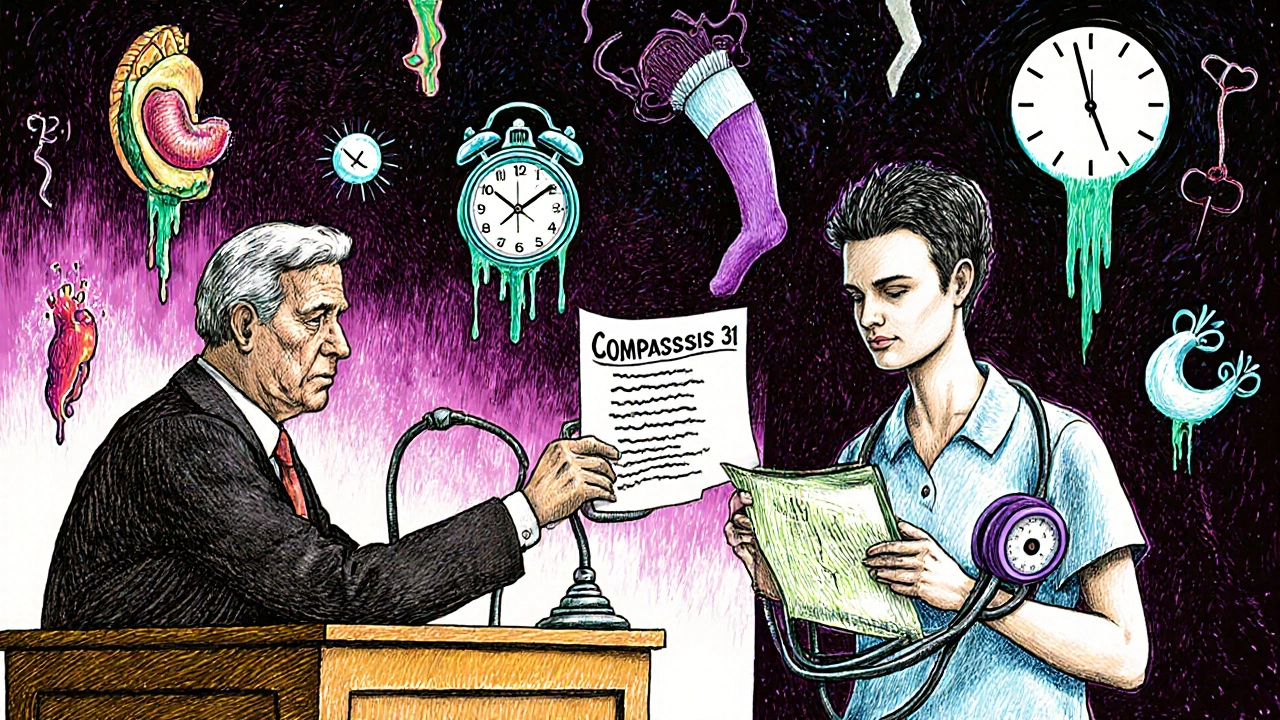When you stand up from a chair, your body should automatically adjust your blood pressure to keep you from feeling dizzy or fainting. But for people with autonomic neuropathy, that automatic response breaks down. Their blood pressure plummets, their heart races, and sometimes they pass out. At the same time, food sits in their stomach for hours, they vomit at night, or they alternate between constipation and explosive diarrhea. These aren’t random quirks-they’re signs of a hidden neurological disorder damaging the nerves that control your insides.
What Exactly Is Autonomic Neuropathy?
Autonomic neuropathy isn’t one disease. It’s a breakdown in the autonomic nervous system-the part of your nerves that runs your body without you thinking about it. It controls your heart rate, blood pressure, digestion, sweating, and even bladder function. When these nerves get damaged, your body can’t respond properly to changes in position, food intake, or stress. Most cases-85% to 90%-are tied to long-term diabetes. High blood sugar slowly fries the tiny blood vessels that feed these nerves. But it’s not just diabetes. Autoimmune disorders, certain chemotherapy drugs like vincristine, Parkinson’s disease, and even some viral infections can trigger it too. The problem? Most people don’t realize they have it until symptoms get bad. Studies show only about 30% of primary care doctors recognize the signs early. That means many patients suffer for years before getting a diagnosis.Why Your Blood Pressure Crashes When You Stand Up
One of the most dangerous and common symptoms is orthostatic hypotension. That’s just a fancy term for when your blood pressure drops too much when you stand. The definition? A drop of 20 mmHg in systolic pressure or 10 mmHg in diastolic within three minutes of standing. In severe cases, people drop from 120/80 to 85/55 in seconds. This happens because the sympathetic nerves that normally squeeze your blood vessels to push blood upward aren’t firing. Without that squeeze, blood pools in your legs and belly. Your brain doesn’t get enough oxygen. That’s when you feel lightheaded, blurry vision, or worse-you faint. Studies show 30% of people with diabetic autonomic neuropathy have this problem. But it’s worse than that. In one study of 450 patients, 68% had systolic blood pressure below 90 mmHg when standing. And 42% had symptoms like dizziness or near-fainting at least once a week. Even walking across a room can trigger it. The 6-minute walk test reveals another clue: these patients only reach 55-65% of their expected heart rate, while healthy people hit 85-90%. There’s also POTS-Postural Orthostatic Tachycardia Syndrome. It’s not the same as orthostatic hypotension. In POTS, your blood pressure doesn’t drop much, but your heart rate spikes by 30 beats per minute or more when you stand. It’s common in young women and can feel like your heart is trying to escape your chest. Around 1 to 3 million Americans have POTS, and many are misdiagnosed with anxiety.What’s Going On With Your Stomach and Gut?
While blood pressure crashes grab attention, the gut symptoms are just as disabling-and often more embarrassing. Gastroparesis is the big one. It means your stomach doesn’t empty on time. Normal stomachs empty in under two hours. In gastroparesis, more than 10% of food is still sitting there after four hours. That’s measured with a gastric emptying scan, the gold standard. About 30% of people with autonomic neuropathy have it. And it’s not just bloating. People vomit-often at night. One study found 78% of gastroparesis patients with this condition vomit during sleep. Nearly half vomit daily. Constipation hits 60% of patients. Bowel movements drop from a normal 4-5 per week to just 1.2. Then, suddenly, they get diarrhea-often at night. About 25% have this alternating pattern. Why? The nerves controlling the colon are damaged. Sometimes the colon is too slow. Other times, bacteria overgrow in the small intestine (SIBO). In fact, 52% of autonomic neuropathy patients with GI symptoms test positive for SIBO, compared to just 15% in healthy people. That’s why bloating, gas, and diarrhea stick around even when you eat clean. Swallowing gets harder too. Up to 60% have abnormal esophageal contractions. That means food feels stuck, or you choke on liquids. It’s not just discomfort-it’s a choking risk.
How Doctors Diagnose It
There’s no single blood test. Diagnosis relies on symptoms and specific tests. For blood pressure issues, the 10-minute active stand test is the first step. You lie down for five minutes, then stand up. Your blood pressure and heart rate are checked every minute. A drop of 20/10 mmHg confirms orthostatic hypotension. Heart rate variability during deep breathing is another clue-if your heart doesn’t speed up and slow down properly with breathing, your nerves are damaged. For the gut, gastric emptying scintigraphy is still the best test. You eat a meal with a tiny bit of radioactive tracer, then a camera tracks how fast it leaves your stomach. Newer wireless capsules that measure pressure and pH as they move through your gut are 92% accurate and don’t require radiation. There’s also the COMPASS-31 questionnaire-a 31-question survey that scores autonomic symptoms from 0 to 100. A score above 30 means significant dysfunction. It’s not perfect, but it correlates with real test results 85% of the time.What Treatments Actually Work
There’s no cure. But you can manage symptoms-and many people do much better than they expect. For low blood pressure:- Fludrocortisone helps your body hold onto salt and water. It works for 60% of people, but 35% end up with high blood pressure when lying down.
- Midodrine tightens blood vessels. It’s effective in 70% of cases, but you have to take it only when upright-no doses after 6 PM or you’ll sleep with dangerously high BP.
- Compression stockings (30-40 mmHg) help push blood back up. They reduce symptoms by 35%.
- Abdominal compression garments help both blood pressure and stomach emptying. One Mayo Clinic trial showed a 40% drop in dizziness.
- Ivabradine slows down a racing heart in POTS. It cuts heart rate by 15-25 bpm in 65% of users.
- Metoclopramide used to be the go-to drug. It improves emptying in half of patients. But it can cause permanent twitching (tardive dyskinesia) after 12 weeks. Most doctors avoid it now.
- Erythromycin works fast but stops working after a few weeks. Most people develop tolerance.
- Pyridostigmine is now recommended as a first-line option. It improves symptoms in 55% of people with minimal side effects.
- Diet changes make a huge difference. Eating six small meals a day, cutting fat to under 25g, and fiber to under 10g reduces vomiting and bloating by 50% in 60% of patients.
- Low-FODMAP or low-residue diets help with SIBO and diarrhea. Many patients report fewer nighttime bathroom trips and less bloating.

Life With Autonomic Neuropathy
This isn’t just a medical condition. It’s a lifestyle shifter. People avoid hot showers, standing in long lines, or eating out. One Reddit user said, “I stopped going to restaurants because I never knew if I’d vomit in the middle of dinner.” Another said, “I wear compression leggings every day. It’s not glamorous, but I can stand long enough to get groceries.” The average time to diagnosis? Nearly five years. Many see three or more doctors before someone connects the dots between dizziness, vomiting, and fatigue. But there’s hope. New research is moving fast. The NIH is testing fecal transplants for gut symptoms-with early results showing 40% improvement in quality of life. Blood tests measuring neurofilament light chain are becoming possible, which could detect nerve damage before symptoms start. The American Diabetes Association now recommends annual screening for autonomic neuropathy in anyone with diabetes for more than seven years. That could catch 500,000 new cases a year.What You Can Do Today
If you have diabetes and you’re feeling dizzy when you stand, or you’re vomiting at night, or you’re constipated but then suddenly have diarrhea-don’t ignore it. These aren’t normal aging issues. They’re warning signs. Start by tracking your symptoms. Write down:- When you feel dizzy (after standing? after eating?)
- How often you vomit or have diarrhea
- How many bowel movements you have per week
- Whether you feel better sitting or lying down


Kezia Katherine Lewis 21.11.2025
Orthostatic hypotension in autonomic neuropathy isn't just about dizziness-it's a systemic dysautonomia cascade. The baroreflex arc is compromised, leading to inadequate norepinephrine release from postganglionic sympathetic neurons. This isn't 'getting old'-it's neurodegenerative autonomic failure. The 10-minute stand test is underutilized; we need to screen diabetics proactively, not reactively. Compression garments aren't fashion-they're neurophysiological support devices. And yes, pyridostigmine is underappreciated as a first-line cholinergic modulator for GI dysmotility.
Henrik Stacke 21.11.2025
My goodness, this is one of the most lucid, compassionate, and clinically precise summaries I've ever encountered on this topic. As a physician in London, I see patients suffering for years before diagnosis-often dismissed as 'anxiety' or 'depression.' The COMPASS-31 is a revelation. I've started using it in every diabetic review. And the bit about SIBO? Absolutely critical. I've had patients whose lives changed after a lactulose breath test and rifaximin. Thank you for writing this.
Manjistha Roy 21.11.2025
People need to understand this isn't a choice. It's not laziness. It's not being dramatic. It's nerve damage. I've seen it in my father-he used to walk three miles to work. Now he can't stand in line at the pharmacy without sitting down. The vomiting at night? That's not indigestion. That's gastroparesis. The constipation? Not 'not enough fiber.' It's autonomic failure. Please stop blaming people. This is real. This is neurological. This is invisible. And it's devastating.
Jennifer Skolney 21.11.2025
I was diagnosed with POTS last year after 4 years of being told I was 'just anxious.' I thought I was losing my mind. Then I found out my heart rate jumps to 150 just from standing to brush my teeth. Compression socks changed my life. I wear them every day-even to bed sometimes. And the low-FODMAP diet? It's not perfect, but I don't have midnight bathroom emergencies anymore. You're not alone. We're here. 💪
JD Mette 21.11.2025
This is a very thorough and well-structured overview. I appreciate the balance between clinical detail and patient experience. The mention of the 6-minute walk test and heart rate variability is particularly useful. Many clinicians overlook these objective measures. It's refreshing to see such a comprehensive summary that doesn't oversimplify or sensationalize.
Olanrewaju Jeph 21.11.2025
Autonomic neuropathy is a complex, multisystem disorder that demands a multidisciplinary approach. The pathophysiology involves both small-fiber and autonomic nerve degeneration, often secondary to metabolic, autoimmune, or iatrogenic insults. The diagnostic criteria, including orthostatic hypotension defined by a 20/10 mmHg drop, are well-established. However, underdiagnosis persists due to fragmented care. Early intervention with non-pharmacological modalities-hydration, sodium intake, compression-is evidence-based and cost-effective. Pyridostigmine, as noted, has emerged as a safer alternative to metoclopramide. The future lies in neuroprotective agents and biomarkers such as neurofilament light chain.
Dalton Adams 21.11.2025
Okay, let's be real-this post is basically a textbook chapter. But here's the thing: most doctors still don't get it. I've seen patients on 10 medications, all wrong. Fludrocortisone? Fine. But midodrine after 6 PM? That's how you get supine hypertension and stroke risk. And nobody talks about how SIBO isn't just 'bacteria'-it's a microbial ecosystem collapse from chronic dysmotility. And the fecal transplant trials? They're not 'alternative.' They're the future. Also, if you're not using wireless motility capsules, you're practicing 2010 medicine. The NIH is moving fast. Are you? 😏
Kane Ren 21.11.2025
This is the kind of post that gives hope. I used to think I was broken. Now I know my body just has faulty wiring-and that wiring can be managed. I didn't know about the COMPASS-31. I'm printing it out for my doctor tomorrow. And I'm trying the low-residue diet this week. I'm not cured, but I'm not helpless anymore. Thank you for giving us the tools to fight back.
Charmaine Barcelon 21.11.2025
Why do people keep saying 'it's manageable'? It's not. It's a slow, humiliating, exhausting death sentence. You can't 'manage' vomiting in your sleep. You can't 'manage' fainting in the grocery store. You can't 'manage' being too weak to hold your kid. This isn't a blog post. This is your life being stolen. And no, compression socks don't fix it. They just make you look like a medical supply catalog.
Karla Morales 21.11.2025
Let’s analyze the data: 85–90% of cases are diabetes-related. That’s not ‘coincidence’-that’s a public health catastrophe. We’re literally frying nerves with glucose. And yet, the ADA only recommends screening after 7 years? That’s too late. We need real-time continuous autonomic monitoring. Think: wearable sensors tracking HRV, skin conductance, GI motility. And why aren’t we using AI to predict symptom clusters? The tech exists. The will doesn’t. 🤖📉
Javier Rain 21.11.2025
Listen-I’ve been there. I used to collapse after standing up to get coffee. Now? I drink 3L of water a day, wear my compression gear like armor, and eat six tiny meals. I still have bad days. But I’m working again. I’m traveling. I’m alive. This isn’t the end. It’s a new beginning. You don’t have to be defined by your nerves. You can outsmart them. And you’re not alone. Let’s go.
Laurie Sala 21.11.2025
I’ve been reading this for an hour. I cried. I called my sister. I screamed into my pillow. I’ve been vomiting at night for 18 months. No one believed me. I thought I was crazy. I thought I was weak. I thought I was failing. But it’s not me. It’s my nerves. And now… now I know. And I’m not alone. Thank you. Thank you. Thank you.
Lisa Detanna 21.11.2025
To everyone here: you're not broken. You're not exaggerating. You're not lazy. You're navigating a neurological storm no one sees. And you're still showing up. That’s courage. I don't care if you're in Nigeria, India, or Nebraska-we’re in this together. The science is catching up. The community is growing. And your voice matters. Keep speaking. Keep tracking. Keep asking for the test. We see you.